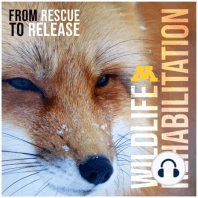45 min listen

S1 Bonus Episode: Highly Pathogenic Avian Influenza with Dr. Victoria Hall
S1 Bonus Episode: Highly Pathogenic Avian Influenza with Dr. Victoria Hall
ratings:
Length:
46 minutes
Released:
Apr 11, 2022
Format:
Podcast episode
Description
North America is currently experiencing an outbreak of Highly Pathogenic Avian Influenza (HPAI) in both wild and domestic birds. To discuss this devastating disease and the implications for wildlife rehabilitation, I am joined by Dr. Victoria Hall, Executive Director at TheRaptorCenter at the University of Minnesota. Dr. Hall is the Patrick T. Redig Endowed Chair in Raptor and Ecosystem Health. She holds a Master of Science in Preventative Medicine and a Doctorate of Veterinary Medicine from Mississippi State and is board certified in Veterinary Preventive Medicine. Dr. Hall has spent her career working at the intersection of human, animal, and environmental health - an intersection known as “One Health.” Dr. Hall formerly served as an Epidemic Intelligence Service Officer for the Centers for Disease Control and Prevention, responding to infectious disease outbreaks in human health, including: multidrug resistant tuberculosis, measles virus, and Zika virus. With experience at organizations including the Smithsonian National Zoo, the Food and Agriculture Organization of the United Nations, and the United States Department of Agriculture, Dr. Hall is passionate about working on complex ecosystem health challenges on a global scale and engaging stakeholders and partners of all levels. Now as Executive Director of The Raptor Center, she oversees a team of professionals who treat over 1,000 injured raptors a year and who care for 28 ambassador birds. In addition to excellence in care for individual birds, she also leads innovative ecosystem health research at the University of Minnesota to help secure the future of the environment that humans and animals share. This involves working on critical health challenges, like SARS-CoV-2, lead toxicity, and avian influenza which is the topic of this episode. Dr. Hall describes what HPAI is, what the letter/number combination H5N1 mean, and how seriously we should be concerned about this globally reportable disease. How does the disease (if the bird is symptomatic) manifest? We also talk about what biosecurity means in a wildlife rehabilitation setting —whether it is a one room operation or large wildlife rehabilitation center like The Raptor Center (TRC). Special thanks: Production assistance by Twin Cities based audio engineer Thom Whetston.This episode concludes with the track “Firebirds,” which is the closing track on INFINITE INFINITIES, the debut LP from the band INFINITIES, recorded in Minneapolis in 2015. Simon Calder songwriter and: vox + guitar, Tristan Bion Craig: drums + bass, Leigh Marson: vox recorded and mixed by Adam Paulus at Luck Machine mastered by Edward Folly at Folly Manor. Used with permission from the artist.To download, please visit: https://infinities8.bandcamp.com/track/firebirdsHere are more resources so you can learn more about HPAI. Webinars: TRC: https://umnadvet.instructure.com/courses/524ZAHP: https://zahp.org/hpai-updates-for-zoo-wildlife-professionals-webinar-recording/Resources:USGS: Special thanks to Partners For Wildlife and The Raptor Center at the University of Minnesota College of Veterinary Medicine. Our executive producer and host is Gail Buhl. Our producer is Kirk Klocke.To learn more about The Raptor Center, visit Homepage | The Raptor Center (umn.edu). For more on Partners for Wildlife, visit Partners for Wildlife Home | The Raptor Center (umn.edu).
Released:
Apr 11, 2022
Format:
Podcast episode
Titles in the series (46)
S1E9 Debbie Sykes: White Tail Deer Fawn Raising To Release by Wildlife Rehabilitation: From Rescue to Release